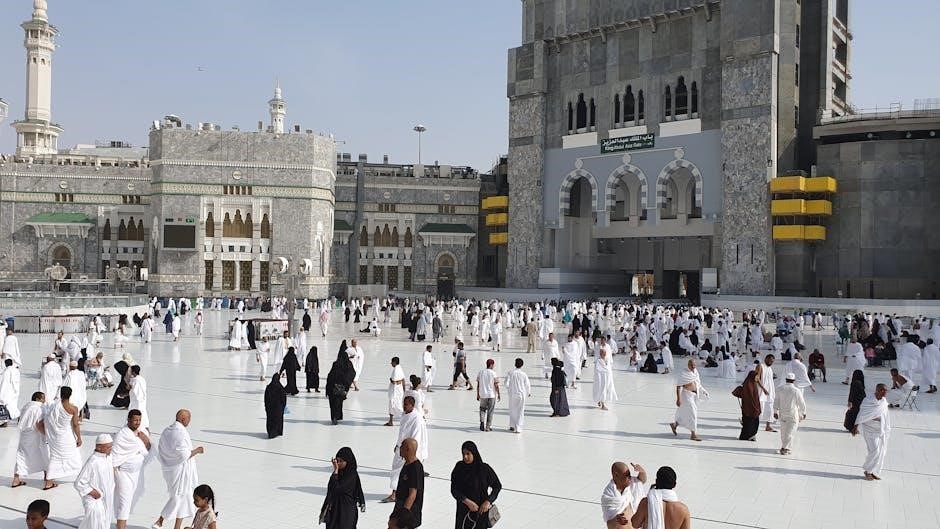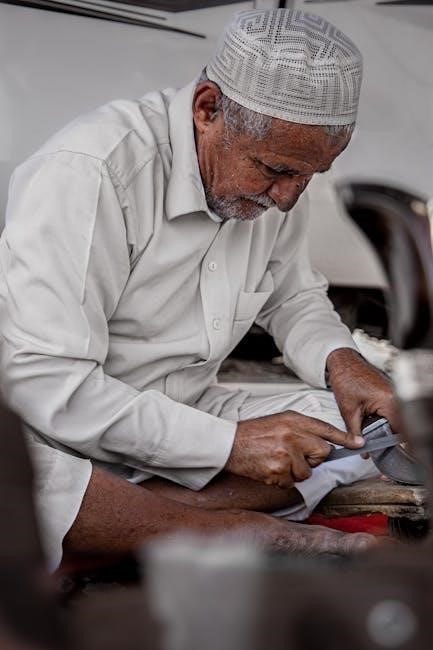Saudi Arabia’s education system is undergoing significant transformation under Vision 2030‚ aiming to align education with national goals and modernize curricula. The system emphasizes Islamic values while incorporating contemporary skills‚ ensuring a balanced approach to student development and societal needs.
1.1 Overview and Vision 2030
Saudi Arabia’s Vision 2030 outlines a comprehensive plan to modernize its education system‚ aligning it with national development goals. The vision emphasizes creating a dynamic and diverse economy by fostering innovation‚ critical thinking‚ and skill development. Education is central to this transformation‚ aiming to eradicate illiteracy and ensure access to quality learning for all citizens. The strategy focuses on enhancing school quality‚ improving teacher training‚ and integrating technology into classrooms. By 2030‚ the goal is to create a knowledgeable society capable of driving economic growth and societal progress while preserving Islamic values and cultural identity. Key objectives include increasing education sector efficiency‚ promoting lifelong learning‚ and preparing students for future challenges. Vision 2030 also prioritizes inclusivity‚ ensuring equitable access to education for all‚ including those with disabilities. This ambitious plan seeks to position Saudi Arabia as a global leader in education and human development.
- Aligning education with economic and social goals.
- Emphasizing innovation and critical thinking.
- Ensuring equitable access to quality education.

Types of Scholar Manuals
Saudi Arabia’s education system utilizes various scholar manuals‚ including Student Guides‚ Parent Guides‚ and Teacher Guides. These resources provide structured frameworks for learning‚ teaching‚ and parental involvement‚ ensuring alignment with educational goals and national standards.

2.1 Student‚ Parent‚ and Teacher Guides
The Saudi Arabian education system provides comprehensive guides tailored for students‚ parents‚ and teachers. These manuals are designed to enhance learning outcomes‚ foster collaboration‚ and ensure alignment with educational goals. Student Guides offer structured frameworks for academic success‚ while Parent Guides empower families to support their children’s education effectively. Teacher Guides equip educators with strategies and resources to deliver high-quality instruction. Additionally‚ specialized guides like the Remote Teaching Strategies Guide and the Special Education Teacher Guide address specific educational needs‚ ensuring inclusivity and adaptability. These resources are widely accessible‚ promoting a cohesive educational environment that aligns with Vision 2030’s objectives of modernizing and improving the education system. By providing clear guidelines and practical tools‚ these manuals play a crucial role in fostering active learning‚ quality assurance‚ and stakeholder engagement in Saudi Arabia’s educational landscape.
2.2 Special Education Manuals

The Kingdom of Saudi Arabia has developed specialized manuals to address the unique needs of students with disabilities and special educational requirements. These Special Education Manuals are designed to provide tailored support‚ ensuring inclusive education and equal opportunities for all learners. The guides are available for special education programs‚ institutes‚ and centers‚ offering comprehensive strategies for educators to cater to diverse learning needs. They include practical tools‚ methodologies‚ and resources to facilitate effective teaching and learning in specialized settings. The manuals emphasize the importance of adapting curricula and instructional strategies to meet individual student needs‚ fostering an inclusive educational environment. By aligning with the Disability Law and other legal frameworks‚ these resources ensure that students with disabilities receive the support necessary to achieve their full potential. These specialized guides reflect Saudi Arabia’s commitment to improving educational accessibility and promoting equity in its education system‚ as outlined in Vision 2030. They play a vital role in enhancing the quality of special education services across the kingdom.
Legal Framework
The legal framework governing Saudi Arabia’s education system includes the Law of Literacy and Disability Law‚ ensuring compulsory education for children aged 6-15. These laws promote educational inclusivity and support for students with disabilities‚ aligning with national development goals.

3.1 Law of Literacy and Disability Law
The Law of Literacy and Disability Law in Saudi Arabia forms a cornerstone of the nation’s educational legal framework. These laws ensure that education is compulsory for all children aged 6 to 15‚ emphasizing the eradication of illiteracy and the inclusion of students with disabilities. The literacy law focuses on providing universal access to basic education‚ aligning with the country’s broader goals of social and economic development. Meanwhile‚ the Disability Law guarantees the right to education for students with special needs‚ ensuring inclusive and supportive learning environments. Together‚ these laws promote equality and accessibility‚ fostering a culture of lifelong learning and skill development. They also outline specific measures to support students with disabilities‚ such as tailored educational programs and resources. By addressing both literacy and disability‚ these laws contribute significantly to the transformation of Saudi Arabia’s education system‚ ensuring it is equitable and aligned with the objectives of Vision 2030.
Role of Technology
Saudi Arabia’s education system has embraced technology through e-learning platforms and digital resources‚ transforming traditional teaching methods. This shift supports interactive learning environments and aligns with Vision 2030 goals‚ enhancing accessibility and quality for both students and educators.
4.1 E-learning and Digital Resources
Saudi Arabia’s education system has significantly embraced e-learning and digital resources as part of its Vision 2030 goals. The transition to e-learning has been accelerated through initiatives like the “Study in Saudi” portal‚ which streamlines scholarship applications and academic processes. Digital textbooks and online platforms have replaced traditional printed materials‚ enhancing accessibility and engagement for students. Additionally‚ the Ministry of Education has introduced remote teaching strategies‚ supported by comprehensive guides for teachers‚ students‚ and parents. These resources ensure continuity of education during challenges like the COVID-19 pandemic.
The integration of technology has also led to the development of interactive educational tools‚ such as multimedia content and virtual classrooms. These innovations aim to create a dynamic learning environment that fosters student participation and understanding. Furthermore‚ digital resources are tailored to meet the needs of special education‚ providing personalized learning experiences for students with disabilities.
The government’s investment in digital infrastructure has been critical in overcoming barriers such as internet connectivity in remote areas. This focus on e-learning not only modernizes the education system but also aligns with the broader objectives of Vision 2030‚ ensuring Saudi Arabia’s youth are equipped with the skills needed for a rapidly changing world.

Teaching Strategies
Saudi Arabia’s education system emphasizes active learning and quality assurance‚ fostering engaging and interactive teaching methods. Guides like the Student Guide and Teacher Guide promote innovative strategies‚ ensuring personalized learning experiences aligned with national educational goals and Vision 2030 objectives.
5.1 Active Learning and Quality Assurance
Saudi Arabia’s education system integrates active learning methodologies to enhance student engagement and critical thinking. Quality assurance measures are implemented to monitor and improve educational standards‚ ensuring alignment with Vision 2030 goals. These strategies focus on fostering a dynamic learning environment‚ where students are encouraged to participate actively in the educational process. Teachers are provided with comprehensive guides‚ such as the Teacher Guide‚ to implement innovative teaching practices that promote intellectual growth and skill development. Additionally‚ the system emphasizes continuous assessment and feedback mechanisms to maintain high-quality education. By prioritizing active learning‚ Saudi Arabia aims to cultivate a generation of students equipped with the knowledge and skills necessary to meet the demands of a rapidly changing world. These efforts are supported by regulatory frameworks that ensure educational institutions adhere to national standards‚ fostering a culture of excellence and accountability in the education sector.
International Schools
International schools in Saudi Arabia play a pivotal role in providing diverse educational opportunities aligned with global standards. These institutions cater to expatriate communities and offer curricula such as British‚ American‚ and International Baccalaureate programs. The Ministry of Education regulates these schools to ensure they meet quality benchmarks while maintaining cultural and educational diversity. International schools are expected to align with Saudi Arabia’s Vision 2030‚ which emphasizes the importance of a globally competitive education system. These schools often emphasize bilingual education‚ teaching both Arabic and English‚ to prepare students for international academic and professional environments. Additionally‚ they incorporate modern teaching methodologies and technologies‚ fostering innovation and critical thinking. The Ministry provides specific guidelines and resources‚ such as the International Schools Regulations Manual‚ to support these institutions in achieving their educational goals. By offering a blend of global curricula and local values‚ international schools contribute significantly to the diversification and modernization of Saudi Arabia’s education landscape‚ preparing students to thrive in an increasingly interconnected world.

Leave a Reply
You must be logged in to post a comment.